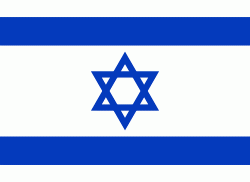Israeli new shekel
₪
The new Israeli shekel (שֶׁקֶל חָדָשׁ '; شيكل جديد ; sign: ₪; ISO code: ILS; abbreviation: NIS), also known as simply the Israeli shekel''' (שקל ישראלי, شيكل إسرائيلي), is the currency of Israel and is also used as a legal tender in the Palestinian territories of the West Bank and the Gaza Strip. The new shekel is divided into 100 agorot. The new shekel has been in use since 1 January 1986, when it replaced the hyperinflated old shekel at a ratio of 1000:1.The currency sign for the new shekel is a combination of the first Hebrew letters of the words shekel and ẖadash (new). When the shekel sign is unavailable the abbreviation NIS (ש״ח and ش.ج) is used.
The origin of the name "shekel" (שֶׁקֶל) is from the ancient Biblical currency by the same name. An early Biblical reference is Abraham being reported to pay "four hundred shekels of silver" to Ephron the Hittite for the Cave of the Patriarchs in Hebron. Shekel is any of several ancient units of weight or of currency in ancient Israel, from the Hebrew root ש-ק-ל (š-q-l) meaning 'weigh' (שָׁקַל šaqal 'to weigh', שֶׁקֶל šeqel 'a standard weight'), common with other Semitic languages like Akkadian (resp. šaqālu and šiqlu) and Aramaic (resp. תְּקַל teqal and תִּקְלָא tiqla). Initially, it may have referred to a weight of barley. In ancient Israel, the shekel was known to be about 180 grains (11 grams or 0.35 troy ounces).
There is evidence that the word entered the Germanic languages as shilling through Phoenician shekel, Punic sql (sə'kel) meaning 'weigh' and 'coin'. The two meanings given in the literature in both Germanic and Semitic word are the same for both a fixed weight and a certain coin. The term would come from the Germanic understanding of shekel as shkel with the common Germanic suffix -ling.
From the formation of the modern State of Israel on 14 May 1948 through 1952 banknotes continued to be issued by the Anglo-Palestine Bank as the Palestine pound which was pegged at £P1 = £1 sterling. In 1952, the Anglo-Palestine Bank changed its name to Bank Leumi Le-Yisrael (National Bank of Israel) and the currency name became the Israeli pound.
Country
-
Israel
Israel (יִשְׂרָאֵל Yīsrāʾēl ; إِسْرَائِيل ʾIsrāʾīl), officially the State of Israel (מְדִינַת יִשְׂרָאֵל Medīnat Yīsrāʾēl ; دَوْلَة إِسْرَائِيل Dawlat Isrāʾīl), is a country in Western Asia. Situated between the Eastern Mediterranean and the Red Sea, it is bordered by Lebanon to the north, by Syria to the northeast, by Jordan to the east, by Egypt to the southwest, and by the Palestinian territories — the West Bank along the east and the Gaza Strip along the southwest — with which it shares legal boundaries. Tel Aviv is the economic and technological center of the country, while its seat of government is in its proclaimed capital of Jerusalem, although Israeli sovereignty over East Jerusalem is unrecognized internationally.
The Southern Levant, of which modern Israel forms a part, is on the land corridor used by hominins to emerge from Africa and has some of the first signs of human habitation. In ancient history, it was where Canaanite and later Israelite civilizations developed, and where the kingdoms of Israel and Judah emerged, before falling, respectively, to the Neo-Assyrian Empire and Neo-Babylonian Empire. During the classical era, the region was ruled by the Achaemenid, Macedonian, Ptolemaic and Seleucid empires. The Maccabean Revolt gave rise to the Hasmonean kingdom, before the Roman Republic took control a century later. The subsequent Jewish–Roman wars resulted in widespread destruction and displacement across Judea. Under Byzantine rule, Christians replaced Jews as the majority. From the 7th century, Muslim rule was established under the Rashidun, Umayyad, Abbasid and Fatimid caliphates. In the 11th century, the First Crusade asserted European Christian rule under the Crusader states. For the next two centuries, the region saw continuous wars between the Crusaders and the Ayyubids, ending when the Crusaders lost their last territorial possessions to the Mamluk Sultanate, which ceded the territory to the Ottoman Empire at the onset of the 16th century.

